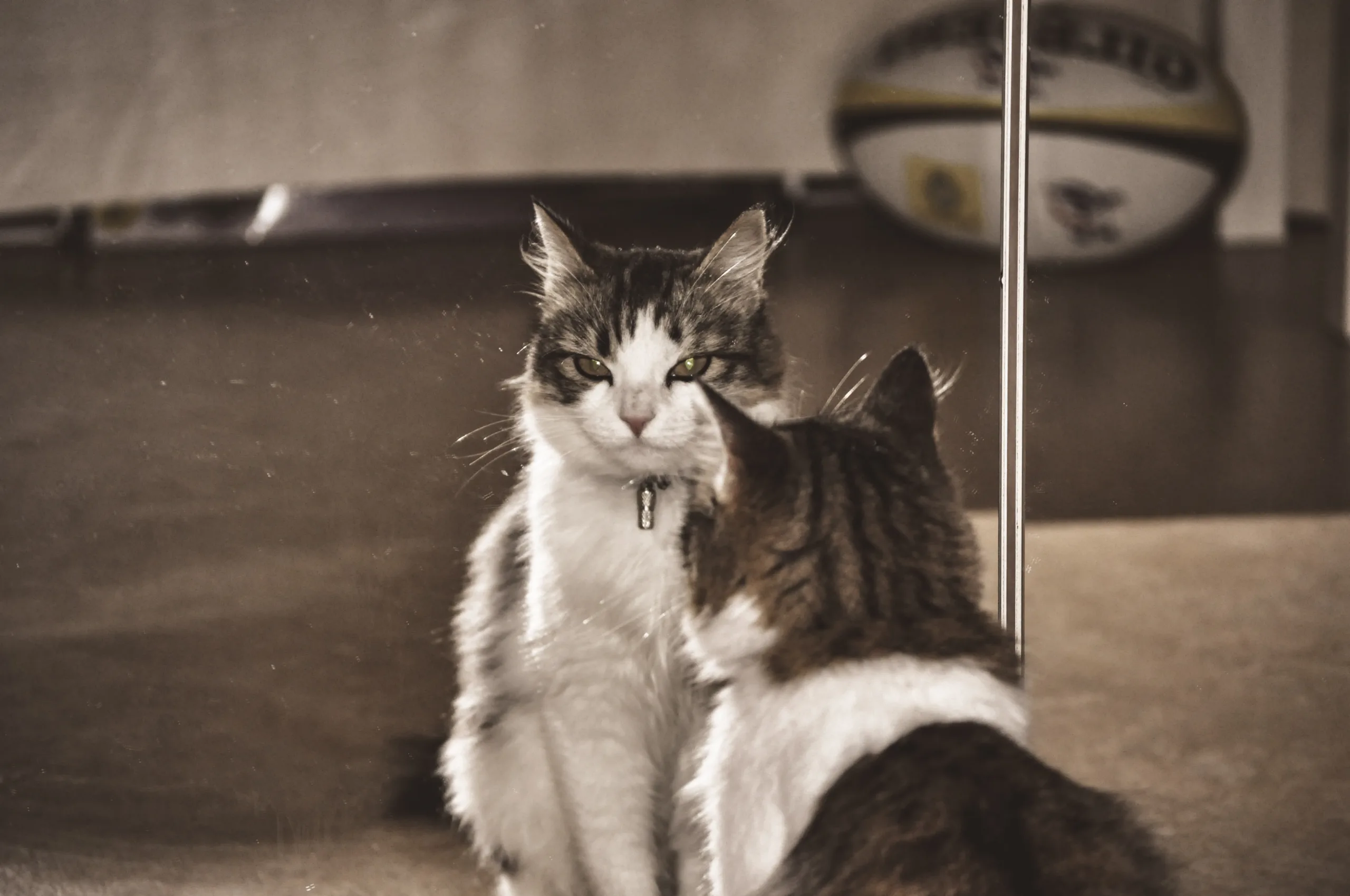Why Do Cats Scratch Mirrors? Cats are known for their curious and sometimes perplexing behaviors, and one such behavior that might leave you scratching your head is their fascination with mirrors. Many cat owners have witnessed their feline friends pawing, scratching, and even hissing at their own reflections in mirrors. But why do cats engage in this behavior? In this article, we will delve into the reasons behind this curious behavior and provide insights into understanding your cat’s fascination with mirrors.
For more about cats click here
The Mirror Mystique: A Cat’s Perspective
To humans, mirrors are a common item used for grooming, vanity, and even decoration. However, for cats, mirrors present a unique and sometimes confusing experience. A cat’s response to their reflection in a mirror can range from curiosity to aggression, and several factors contribute to their interactions with their mirrored selves.
Why Do Cats Scratch Mirrors?
- Territorial Instincts: Cats are territorial animals, and when they encounter a mirror, they may perceive their reflection as an intruder encroaching on their territory. Scratching is a common territorial behavior in cats, and they might scratch the mirror to mark it as their own.
- Visual Stimulation: Cats have highly developed senses, including keen eyesight. When they see their reflection in a mirror, it could be visually stimulating and intriguing for them. The movement and interaction with their own image can trigger their hunting instincts.
- Interactive Play: Cats are known for their love of interactive play. When they scratch the mirror, it can create movement and noise, making it a playful activity for them. The sound of their claws against the surface may also add to their engagement.
- Curiosity and Exploration: Cats are naturally curious creatures. A mirror provides a new and unfamiliar visual element, prompting cats to investigate and interact with it.
- Social Interaction: Cats are social animals, and they may interpret their reflection as another cat or creature. They might scratch at the mirror in an attempt to establish social dominance or engage in play.
- Self-Recognition: While cats may not fully understand that the reflection is their own, they might exhibit behaviors that suggest self-recognition. This could be a result of the cat’s keen senses and ability to perceive slight changes in their environment.
Managing Your Cat’s Mirror Interaction
If your cat’s fascination with mirrors becomes problematic or disruptive, there are several steps you can take to manage their behavior:
- Provide Alternative Outlets: Offer your cat scratching posts, interactive toys, and engaging play sessions to redirect their energy and curiosity.
- Cover the Mirror: Temporarily covering the mirror or placing a decorative cloth over it can reduce your cat’s access to their own reflection.
- Use Distractions: If your cat starts scratching the mirror, gently redirect their attention with a toy or treat.
- Positive Reinforcement: Reward your cat with treats and praise when they engage in appropriate behaviors and interactions.
FAQs About Cats and Mirrors
Q1: Why are cats obsessed with mirrors?
Cats are fascinated by mirrors due to their keen senses, curiosity, and territorial instincts. They might see their reflection as a potential intruder or engage with it as a form of interactive play.
Q2: How do I stop my cat from attacking my mirror?
Provide alternative outlets for your cat’s energy, such as scratching posts and interactive toys. Redirect their attention and offer positive reinforcement for appropriate behaviors.
Q3: Why don’t cats like mirrors?
Cats don’t necessarily dislike mirrors, but their reactions to mirrors are rooted in their natural behaviors, instincts, and sensory perceptions.
Q4: Why do cats scratch flat surfaces?
Scratching is a natural behavior that helps cats maintain their claws, mark their territory, and engage in play. Flat surfaces like mirrors provide an opportunity for scratching.
Q5: Why do cats scratch mirrors at night?
Cats are crepuscular animals, meaning they are most active during dawn and dusk. They might engage with mirrors at night due to increased sensory stimulation and a desire for play.
Q6: Can a cat’s claws scratch glass?
While glass is harder than wood or fabric, a cat’s claws can potentially scratch it over time. However, most mirrors are made of reflective material backed by glass, which is less prone to scratching than pure glass surfaces.
In conclusion, a cat’s fascination with mirrors is a combination of their natural instincts, curiosity, and sensory perceptions. Scratching at mirrors is just one way cats interact with their environment and express their unique personalities. By understanding their behavior and providing appropriate outlets for their energy, you can ensure that your feline friend’s mirror interactions remain engaging and enjoyable for both of you.
Click here for more
